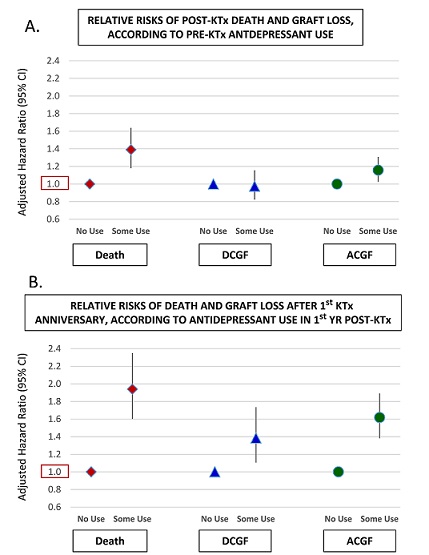Antidepressant Medication Use Before and After Kidney Transplant: Implications for Post-Transplant Outcomes.
K. Lentine,1 A. Naik,2 R. Ouseph,1 Z. Zhang,1 D. Axelrod,3 D. Segev,4 V. Dharnidharka,5 D. Brennan,5 H. Randall,1 R. Gadi,1 N. Lam,6 G. Hess,7 M. Schnitzler,1,8 B. Kasiske.8
1St. Louis Univ, St. Louis
2U of Michigan, Ann Arbor
3East Carolina Univ, Greenville
4Johns Hopkins, Baltimore
5Washington Univ, St. Louis
6Univ Alberta, Edmonton, Canada
7Symphony Health, Philadelphia
8Scientific Registry of Transplant Recipients, Minneapolis
Meeting: 2017 American Transplant Congress
Abstract number: 91
Keywords: Kidney, Mortality, Pain, Risk factors
Session Information
Session Name: Concurrent Session: Psychosocial and Mediation Adherence Concerns
Session Type: Concurrent Session
Date: Sunday, April 30, 2017
Session Time: 2:30pm-4:00pm
 Presentation Time: 2:54pm-3:06pm
Presentation Time: 2:54pm-3:06pm
Location: E271b
Limited data are available on the implications of antidepressant medication use in kidney transplant recipients.
We examined a novel database wherein national transplant registry identifiers for kidney transplant recipients were linked to records from a large US pharmaceutical claims warehouse (2008 to 2015). We selected recipients with 1 year of pretransplant pharmaceutical fill records for primary analyses. Associations of antidepressant use with 1-year posttransplant death and graft failure (adjusted hazard ratio, 95% LCL aHR 95% UCL) were quantified by multivariate Cox regression including adjustment for recipient, donor, and transplant factors, and propensity for antidepressant use.
Among 72,054 eligible patients, 12.6% filled antidepressant medications in the year before transplant, and use was more common among recipients who were women, white, unemployed, or of limited functional status. Pretransplant antidepressant use was associated with 39% higher 1-year mortality (aHR 1.181.391.64) and 15% higher all-cause graft loss risk (aHR 1.021.151.30) (Fig 1A). More than 50% of patients who filled antidepressants pretransplant continued use posttransplant. Antidepressant use in the first year after transplant was associated with approximately 2-fold higher risk of death (aHR 1.601.942.35), 38% higher risk of death-censored graft failure, and 61% higher risk of all-cause graft failure risk over the subsequent year (Fig 1B). While associations may in part reflect underlying behaviors or comorbidity, kidney transplant recipients who are treated with antidepressant medications should be monitored and supported to reduce the risk of adverse patient and graft outcomes.
While associations may in part reflect underlying behaviors or comorbidity, kidney transplant recipients who are treated with antidepressant medications should be monitored and supported to reduce the risk of adverse patient and graft outcomes.
CITATION INFORMATION: Lentine K, Naik A, Ouseph R, Zhang Z, Axelrod D, Segev D, Dharnidharka V, Brennan D, Randall H, Gadi R, Lam N, Hess G, Schnitzler M, Kasiske B. Antidepressant Medication Use Before and After Kidney Transplant: Implications for Post-Transplant Outcomes. Am J Transplant. 2017;17 (suppl 3).
To cite this abstract in AMA style:
Lentine K, Naik A, Ouseph R, Zhang Z, Axelrod D, Segev D, Dharnidharka V, Brennan D, Randall H, Gadi R, Lam N, Hess G, Schnitzler M, Kasiske B. Antidepressant Medication Use Before and After Kidney Transplant: Implications for Post-Transplant Outcomes. [abstract]. Am J Transplant. 2017; 17 (suppl 3). https://atcmeetingabstracts.com/abstract/antidepressant-medication-use-before-and-after-kidney-transplant-implications-for-post-transplant-outcomes/. Accessed February 22, 2026.« Back to 2017 American Transplant Congress
